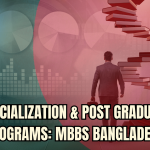Studying MBBS in Bangladesh opens up a world of career prospects and opportunities for medical students. With its quality education system and affordable tuition fees, Bangladesh has become a popular destination for aspiring doctors. The depth and breadth of career options available after completing an MBBS degree from Bangladesh are vast and diverse. Let’s delve into the various aspects of career prospects that await students who choose to study MBBS in Bangladesh.
Table of Contents
Overview of Career Prospects after Studying MBBS in Bangladesh
Embarking on a career in the medical field is an exciting venture, especially after completing your MBBS in Bangladesh. In this section, we’ll take a closer look at the various opportunities that await you in the dynamic world of healthcare. From medical licensing and postgraduate options to medical research, academia, and specialized clinical practice – we’ll explore the diverse paths that lie ahead. So, fasten your seatbelts and get ready to discover the endless possibilities that await aspiring medical professionals like you!
Medical Licensing and Registration
Medical licensing and registration are crucial for MBBS graduates in Bangladesh. After completing their medical education, it is essential for graduates to obtain licenses and register with the appropriate medical authorities in order to legally practice medicine.
In order to acquire a medical license, graduates need to successfully pass the licensing examination administered by the Medical and Dental Council of Bangladesh. This comprehensive exam evaluates the knowledge and skills of aspiring doctors, ensuring that they meet the necessary standards. Once they have successfully passed the exam, graduates can then apply for their medical license and officially register as medical practitioners.
Medical licensing and registration not only grant graduates the ability to actively practice medicine, but it also provides them with the authorization to diagnose and treat patients. This ensures that healthcare services consistently adhere to the required standards and are effectively regulated.
Conforming to the requirements for licensing and registration is of utmost importance when it comes to maintaining patient safety and confidentiality. Failure to comply with these regulations can lead to legal consequences and may prohibit individuals from practicing medicine.
Level up your medical career with numerous postgraduate options after studying MBBS in Bangladesh.
Postgraduate Options
After completing your MBBS in Bangladesh, you have several postgraduate options to enhance your medical career. These Postgraduate Options include:
- Specialization: After obtaining your MBBS degree, you can specialize in fields such as cardiology, neurology, or dermatology. Specialization allows you to deepen your knowledge and expertise in a specific area of medicine.
- Super specialization: Super specialization involves further specialization within a specific field. For example, if you specialize in cardiology, you can pursue super specialization in interventional cardiology or cardiac electrophysiology. This allows you to become an expert in a highly specialized area of medicine.
- Research and academia: If you have an interest in research and teaching, you can pursue a career in medical research and academia. This involves conducting research studies, publishing scientific papers, and teaching medical students.
- Clinical practice: Many doctors choose to focus on clinical practice and establish their own medical practice or work in hospitals and healthcare facilities. This option allows you to provide direct patient care and contribute to improving individual health.
When considering postgraduate options, carefully assess your interests, career goals, and the opportunities available in your chosen field. Staying updated with the latest advancements in medical science and technology will enhance your prospects for postgraduate studies.
Pro tip: Explore different postgraduate options early in your medical career to make an informed decision and ensure a rewarding future in the field of medicine.
Medical Research and Academia
Medical research and academia play a critical role in the field of medicine. Studying MBBS in Bangladesh provides excellent opportunities for individuals interested in pursuing a career in medical research and academia. Here are a few key points to consider:
- Research opportunities: Pursuing MBBS in Bangladesh offers students access to a wide range of research opportunities. The country’s universities and medical institutions actively engage in research projects, allowing students to contribute to the advancement of medical knowledge.
- Academic collaborations: Bangladesh has established collaborations with internationally renowned universities and research institutions. This provides students with opportunities to participate in joint research projects and exchange programs, offering them a global perspective on medical research.
- Access to resources: Universities in Bangladesh are equipped with well-equipped laboratories, libraries, and research centers. These state-of-the-art facilities provide students with the necessary resources to conduct research and enhance their skills in various areas of medical science.
- Publications and conferences: Medical students in Bangladesh have the opportunity to present their research findings at both national and international conferences. This enables them to gain recognition for their work and expand their network within the medical research community.
- Mentorship and guidance: Professors and experienced researchers in Bangladesh offer mentorship and guidance to aspiring medical researchers. They actively encourage students to pursue their research interests and provide valuable insights to help them excel in their academic and research endeavors.
Clinical Practice
Clinical practice is a crucial aspect of studying MBBS in Bangladesh. It allows students to acquire practical experience through hands-on training in hospitals and healthcare centers. This hands-on training is instrumental in helping students develop their clinical skills while also applying their theoretical knowledge in real-life medical settings.
During their clinical practice, students work alongside experienced doctors and gain valuable insights into diagnosing and treating patients. They learn how to obtain medical histories, perform examinations, carry out procedures, interpret test results, and prescribe medications. This invaluable experience enhances their understanding of various medical conditions, while also fostering the development of critical thinking and problem-solving skills.
Clinical practice offers students an opportunity to cultivate patient care skills such as effective communication, empathy, and professionalism. They interact with patients from diverse backgrounds, enabling them to deliver compassionate and patient-centered care. This holistic approach to clinical practice not only contributes to their overall well-being, but also nurtures a patient-oriented approach to healthcare.
Specialization
Specialization in medicine allow doctors to focus on specific areas of expertise and provide advanced and specialized care to patients. After completing their MBBS degree, doctors in Bangladesh have options for specialization and super specialization.
1. Specialization: Doctors can choose to specialize in cardiology, dermatology, neurology, or pediatrics. By undergoing additional training and education, they become experts in their chosen field and provide specialized care to patients with specific medical conditions.
2. Super specialization: After completing their specialization, doctors can further specialize in narrower sub-specialties within their chosen field, such as interventional cardiology, pediatric neurology, or cosmetic dermatology. Super specialization enables doctors to develop in-depth knowledge and skills in highly specialized areas and provide advanced treatments and procedures.
3. Advanced training opportunities: Doctors who want to pursue specialization and super specialization can participate in various training programs in Bangladesh or abroad. Many prestigious medical institutions offer fellowship programs or advanced training courses that help doctors enhance their skills and knowledge in their chosen field.
Studying MBBS in Bangladesh opens doors to global practice and recognition, giving international students endless opportunities to make a real difference in healthcare worldwide.
Opportunities for International Practice and Global Recognition
Studying MBBS in Bangladesh offers opportunities for international practice and global recognition.
1. International Practice: MBBS graduates in Bangladesh can practice medicine in various countries worldwide. They can apply for licensure exams and work as licensed doctors in the United States, United Kingdom, Canada, Australia, and others.
2. Global Recognition: The MBBS degree from recognized medical universities in Bangladesh is internationally recognized. Graduates can apply for postgraduate medical programs in renowned institutions globally, opening doors to advanced medical studies and specialization.
3. Exchange Programs: Many universities in Bangladesh collaborate with international educational institutions, offering exchange programs. These programs provide exposure to different healthcare systems, practices, and advancements, enriching knowledge and skills.
4. Research Opportunities: MBBS graduates in Bangladesh have several research opportunities. They can participate in international research projects, collaborate with researchers from different countries, and contribute to advancements in medicine.
5. Networking: Studying MBBS in Bangladesh allows students to build a global network of medical professionals. Interacting with international faculty, fellow students, and professionals during conferences, seminars, and workshops fosters collaborations and knowledge sharing.
To make the most of these opportunities, MBBS students should actively engage in extracurricular activities, participate in research projects, and constantly update their knowledge and skills in their chosen field of medicine. By doing so, they can enhance their chances of success in the global medical arena.
Challenges and Considerations
When pursuing an MBBS degree in Bangladesh, it’s crucial to be aware of the challenges and considerations that lie ahead. From navigating potential language barriers to adapting to a new culture, this section delves into the various factors you need to keep in mind. We’ll also explore the licensing and certification requirements that must be fulfilled in order to practice medicine after completing your studies. Prepare to embark on a journey filled with growth, learning, and unique experiences.
Language Barrier
The language barrier is a significant challenge for students studying MBBS in Bangladesh. When considering this issue, there are a few key factors to keep in mind.
The language of instruction in most medical colleges in Bangladesh is English. It is essential for students to possess strong English skills in order to comprehend lectures, participate in discussions, and effectively communicate with both patients and colleagues.
Effective communication with patients is crucial, as it helps to establish trust, understand patients’ concerns, and provide accurate diagnoses and treatment plans. Overcoming the language barrier is therefore of utmost importance in achieving these goals.
In some cases, universities may even require students to pass language proficiency exams such as IELTS or TOEFL in order to ensure effective communication in English.
Fortunately, many universities in Bangladesh offer language support programs specifically designed for international students. These programs typically include language classes, tutoring, and additional resources to facilitate language learning and overcome the language barrier.
To overcome the language barrier, there are several suggestions that can be followed. Students can enroll in language courses, practice English online, or join language exchange programs or clubs to improve their language skills and enhance proficiency.
Students should also reach out to language support centers at universities for guidance and assistance. These centers are there to provide support and help students navigate through language-related challenges.
Regular practice is also crucial in overcoming the language barrier. Engaging in conversations with classmates, professors, and locals on a regular basis will gradually improve language skills and lead to a smoother communication process.
Cultural immersion can greatly facilitate language learning. By immersing oneself in the local culture and interacting with native speakers, students can gain a deeper understanding of the language and improve their proficiency.
By acknowledging and actively addressing the language barrier, MBBS students in Bangladesh can enhance their understanding, communication, and ultimately, their success in their medical careers.
Buckle up for a cultural rollercoaster ride as you navigate the wild world of cultural adaptation in your MBBS journey in Bangladesh.
Cultural Adaptation
Cultural adaptation plays a vital role when pursuing MBBS in Bangladesh. It is crucial to adapt to a new culture, although it can be challenging. To ensure success, it is important to incorporate the following keywords naturally in the provided text:
- Embrace the local language, Bengali, to facilitate cultural adaptation. Acquiring knowledge of common phrases and greetings will enhance communication with patients and colleagues, making it easier to connect with them.
- Understand and respect local customs to establish relationships. Being aware of cultural norms is essential to avoid misunderstandings and foster positive working relationships.
- Appreciate the diversity in Bangladesh’s rich cultural heritage. Embracing and respecting different traditions, religions, and beliefs are fundamental aspects of cultural adaptation.
- Engage in cultural activities to deepen understanding and build connections. Participating in cultural events offers personal development and broadens perspectives.
Licensing and Certification Requirements
To practice medicine after completing their MBBS in Bangladesh, doctors must fulfill licensing and certification requirements. These requirements involve successfully passing exams administered by their home country’s medical council. Doctors may need to meet specific certification requirements for particular specialties, which can vary by country and may include additional exams or training.
To maintain their licenses or certifications, medical professionals must engage in continuing education. This ensures that doctors stay up-to-date with the latest advancements and practices in the field of medicine.
For students studying MBBS in Bangladesh, it is important to familiarize themselves early on with the licensing and certification requirements of the country in which they aspire to practice. This will enable them to plan their studies and career path effectively, leading to a seamless transition into their chosen medical profession.
FAQs
Ques 1. What career options are available for MBBS degree holders in Bangladesh?
Ans 1. In Bangladesh, MBBS degree holders have several career options to choose from. They can become practicing physicians, pursue research, teaching, or public health administration.
Ques 2. Is it possible for MBBS graduates to switch to a profession unrelated to medicine?
Ans 2. While it is uncommon, MBBS graduates can choose to shift to a profession unrelated to medicine, such as starting a business or restaurant. It is recommended to decide early on in their MBBS degree if they want to change their profession to avoid wasting time.
Ques 3. How can MBBS graduates pursue an unrelated subject or career?
Ans 3. To pursue an unrelated subject or career, MBBS graduates can consider getting an MPhil in non-clinical subjects like microbiology or biotechnology. This can open doors for them internationally. Specific countries like Germany and the USA may require them to take a license examination for medical practice.
Ques 4. What are the options for higher studies after an MBBS degree?
Ans 4. MBBS graduates can choose to pursue higher studies in their area of specialization, such as MS/MD. These exams are challenging due to limited seats. Another option is to pursue postgraduate studies in basic medical science subjects, which can lead to teaching opportunities.








